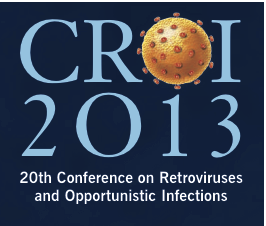Monthly injection protects macaques from rectal exposure: results should fast-track human studies for advanced PrEP options
1 April 2013. Related: Conference reports, HIV prevention and transmission, CROI 20 (Retrovirus) 2013.
Simon Collins, HIV i-Base
 Probably, the most important prevention study at CROI 2013 came from a study in 16 macaque monkeys.
Probably, the most important prevention study at CROI 2013 came from a study in 16 macaque monkeys.
Half these animals were given a long-acting formulation of an integrase inhibitor and all were protected from SHIV infection, following multiple rectal exposures, compared to none of the control animals.
This was an oral late breaker abstract presented by Chastity Andrews and colleagues at the Aaron Diamond Institute, in association with GSK, with the research funded by a public grant from the US NIAID. [1]
The compound, called GSK744, is similar to dolutegravir, and at 5 mg and 30 mg doses of the oral formulation produced viral load reductions of –2.0-2.5 log copies/mL after ten days of monotherapy. In a poster presented at the AIDS 2012 conference in Washington last year, five long acting parenteral (LAP) formulations (IM and SC) with a plasma half-life of 21-50 days in HIV negative volunteers, maintained therapeutic drugs levels (above the adjusted IC90 with 200, 400 and 800 mg/mL doses) from a single injection out to six months. At the highest dose, therapeutic levels were maintained at 4 times the IC90 levels for greater than three months, with a half-life ranging from 3-7 weeks. [2]
The macaque study at CROI included 16 animals, randomised half the animals to two cycles of intramuscular injections of 50 mg/kg GSK 744 LAP, dosed on weeks -1 and 3 (with the monthly dose based on a shorter half-life compared to human PK). Each cycle involved two injections into each quadrecept. Animals were challenged rectally with SHIV162P3 at week 0 and then weekly for up to eight weeks, or until infection was confirmed by real time PCR.
All 8 animals receiving active drug were protected throughout the 8 weeks and during subsequent 10 weeks follow-up in contrast to control animals who became infected following 1-7 challenges (median 2 challenges), p<0.0001. Proviral DNA in PBMCs and virus specific antibodies were only detected in the infected animals.
Plasma concentrations of GSK-744LAP were variable but remained more than four-fold above the IC90 level for all animals for 6/8 weeks but dropped to below the IC90 level in two animals for the last two weeks. These data were comparable to human results using an 800 mg injection.
comment
These first efficacy results in macaques are similar to those seen with tenofovir/FTC more than 12 years ago, which had a similarly high level of protection from rectal exposure.
Crucially, the compound has the potential for monthly or perhaps quarterly injections – overcoming the considerably reduced effectiveness of daily oral PrEP due to intermittent adherence. Similarly, the low active dose and more effective and targeted drug delivery has the potential to dramatically reduce concerns about toxicity, treatment cost and perhaps drug resistance.
Given the experience learned from studies using oral PrEP, the timeline for development should be shorter than was required for tenofovir/FTC and could offer a safer setting for non-inferiority prevention studies, enabling all participants to receive potentially active interventions.
Public funding for this research should be matched by an affordable access price to the final compound if it is proved to be effective.
References:
- Andrews C et al. Long-acting parenteral formulation of GSK1265744 protects macaques against repeated intrarectal challenges with SHIV. 20th CROI, 3-6 March 2013, Atlanta. Oral late breaker abstract 24LB.
http://www.retroconference.org/2013b/Abstracts/48044.htm
Webcast: (first session)
http://webcasts.retroconference.org/console/player/19409?mediaType=podiumVideo - Spreen W et al. Pharmacokinetics, safety and tolerability of the HIV integrase inibitor SGSK1265744 long acting parenteral nanosuspension following single dose administration to healthy adults. 19th International AIDS Conference, 22-27 July 2012, Washington. Abstract TUPE040.
http://pag.aids2012.org/abstracts.aspx?aid=10191

